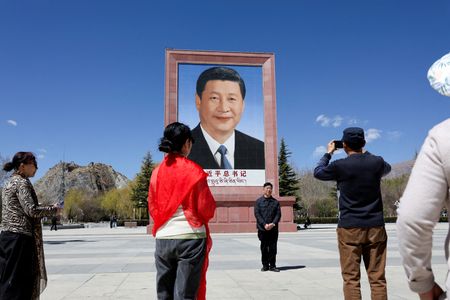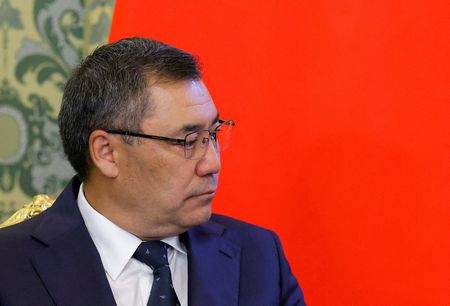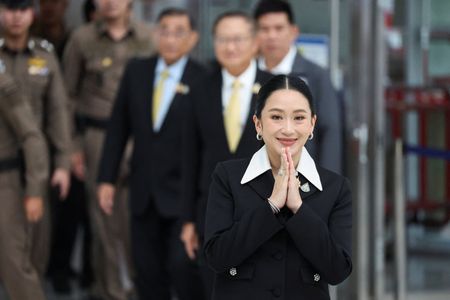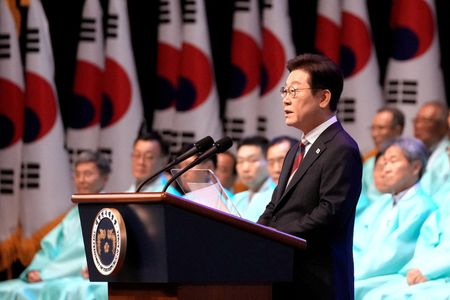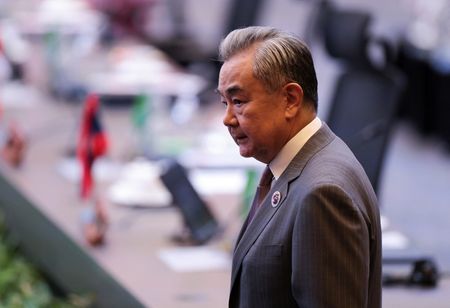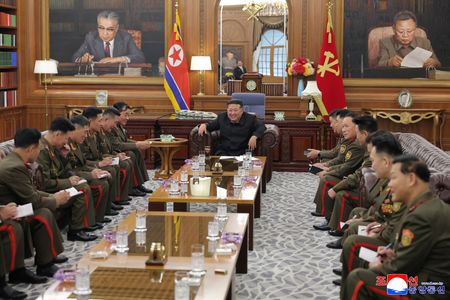By Ryan Woo
BEIJING (Reuters) -Tibet marked its 60th year as a Chinese autonomous region on Thursday with songs, dances and a parade in its capital Lhasa with thousands cheering, holding little red flags, amid placards telling all to heed the Communist Party’s leadership.
The festivities held at a massive square by the Potala Palace, the former winter residence of the Dalai Lama, coincided with a rare visit by President Xi Jinping and a huge delegation from Beijing that included senior leaders from the party and government.
In the parade broadcast on China’s national television, participants held aloft red placards reminding all of what Tibet needed to accomplish under the guidance of Xi.
“Unwaveringly focus on the four major tasks of ensuring stability, promoting development, protecting the ecological environment, and strengthening border defence,” one placard read.
“Adhere to the guidance of Xi Jinping Thought on Socialism with Chinese Characteristics for a New Era and fully implement the Party’s strategy for governing Tibet in the new era,” another said.
In September 1965, six years after the 14th Dalai Lama fled into exile in India in the wake of a failed uprising, the Communist Party established the Tibet Autonomous Region – China’s fifth and last autonomous region after Inner Mongolia, Xinjiang, Guangxi and Ningxia.
The designation is meant to confer ethnic minority groups such as the Tibetans greater say over policy matters, including freedom of religious belief. But human rights groups and exiles describe China’s rule in Tibet over the decades as “oppressive”, an accusation that Beijing rejects.
Since Xi became chief of the Communist Party in late 2012 and then president in early 2013, China has exerted greater institutional control in Tibet – from requiring Tibetan Buddhism to be guided by the Chinese socialist system to demanding its people “follow the party”. Foreign journalists and diplomats still require special permission to set foot in Tibet.
Amid foreign criticism of its rule in Tibet, China says the lives of ordinary people have dramatically improved and their rights have been under state protection.
From 2012 to 2024, Tibet’s road network nearly doubled to 120,000 km (74,565 miles), linking every town and village. Its economy also grew to 276.5 billion yuan ($39 billion) in 2024, a 155-fold increase from 1965, according to official data.
DALAI LAMA
China’s hold over Tibetan Buddhism also extends to how the next Dalai Lama should be picked. The aging cleric turned 90 last month.
Beijing said it has the final say over his successor when he dies, rejecting the Dalai Lama’s assertion that a non-profit institution set up by him would have the sole authority to do so.
China also opposes all contact between political leaders and the Dalai Lama, saying it would send the wrong signal to “separatist” forces.
After Czech President Petr Pavel met the Dalai Lama in India on a private trip this year, China said it would “cease all engagement” with him.
Images of the Dalai Lama, condemned by Beijing as a “wolf in monk’s robes”, are forbidden in Tibet.
“Any attempt to split the motherland and undermine Tibet’s stability is doomed to fail!” said Wang Huning, the Communist Party’s fourth-ranked leader, on a stage in the heart of Lhasa while a seated Xi, who did not speak at Thursday’s festivities, looked on.
Despite the cheering crowds, songs and dances, the twin threats of “separatism” and instability in Tibet remain real and well in the minds of Chinese leaders.
Wang, repeating Xi’s exhortation a day earlier, said: “(We must) deepen our struggle against separatism.”
($1 = 7.1722 Chinese yuan renminbi)
(Reporting by Ryan Woo; Editing by Stephen Coates)

